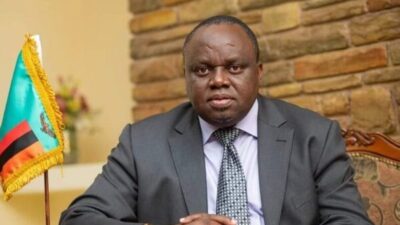Government says it will continue to dismantle regulatory barriers that may prevent the uptake of renewable energy by businesses and citizens.
In this vein, government has developed numerous policies aimed at promoting clean energy which includes the renewable energy strategy and action plan.
This is according to Commerce, Trade and Industry Minister, Chipoka Mulenga, in commemorating the 2023 world consumer rights day under the theme “Empowering Consumers Through Clean Energy Transitions.”
Mulenga regretted there were still barriers that prevented the uptake of renewable energy by businesses and citizens.
He however said government was committed to dismantling such barriers.
Read more: AMEA announces plan to invest in Zambia’s renewable energy sector
“Government also remains committed to providing a stable policy environment and we will continue to dismantle regulatory barriers that may prevent the uptake of renewable energy by our businesses and citizens,” Mulenga said.
He stated that government through the Ministry of Energy, had therefore developed numerous policies aimed at promoting clean energy which included the renewable energy strategy and action plan.
This strategy, he explained, aimed at significantly increasing the uptake of renewable energy technologies in Zambia and contribute to economic growth and poverty reduction.
He stressed that the clean energy transition was essential to delivering growth at a pace and scale required for industrial transformation.
“As a country, we are committed to ensuring that we achieve universal access to affordable, reliable and modern energy services for our people.
“As government, we also remain committed to achieving the set priorities of the sustainable development goal number seven of the United Nations in order to uplift the living standards of our citizens,” Mulenga said.
In addition, he said, Zambia had positioned itself to be a key player in the global energy transition by providing key components required for low-carbon and renewable energy technology.
He stated that copper and cobalt remained critical metals in the transition from using fossil fuels to renewable energy as they could be used in renewable energy sources such as wind and solar powered technology and electric vehicle production.
“Furthermore, Zambia has signed a Memorandum of Understanding with the Democratic Republic of Congo on the development of a value chain in the electric vehicle battery sector.
“Government will, therefore, continue to invest in leveraging local resources to drive Zambia’s clean energy transition as well as to contribute to the global green energy agenda,” Mulenga said.
Meanwhile, Mulenga said to commemorate the world consumer rights day, there would be a virtual conference to discuss various matters that related to empowering consumers through clean energy transitions.
He called on consumers to actively participate in the activities that had been lined up for commemorating this year’s world consumer rights day as this would help them understand many aspects of their consumer rights.
WARNING! All rights reserved. This material, and other digital content on this website, may not be reproduced, published, broadcast, rewritten or redistributed in whole or in part without prior express permission from ZAMBIA MONITOR.












Comments